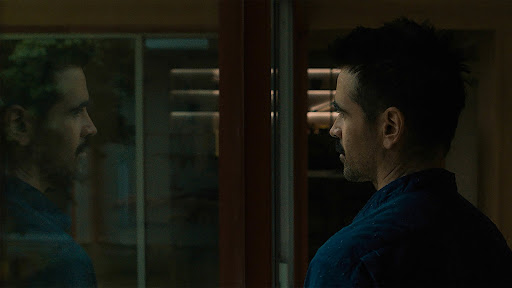Opening the 2022 Sundance Film Festival was a formidable early showing from A24, doling out some wares from what appears to be a softer lineup than most are used to attributing to the zeitgeist-chasing label: still to come in 2022 is Josephine Decker’s THE SKY IS EVERYWHERE, the Daniels’ multiverse-shifting EVERYTHING EVERYWHERE ALL AT ONCE, and a feature-length MARCEL THE SHELL adventure. It already sounds like a far cry from UNCUT GEMS, MIDSOMMAR, THE LIGHTHOUSE, and HIGH LIFE all releasing in the same calendar year. Running a post-Cannes victory lap is Kogonada’s AFTER YANG, and premiering was Jesse Eisenberg’s debut, WHEN YOU FINISH SAVING THE WORLD.

AFTER YANG
Director: Kogonada
For any STAR WARS heads still clamoring for a Disney+ sitcom disconnected from the Skywalkers that’s just about the extra-terrestrial regulars of an off-planet cantina, welcome to a domestic memory play in the BLADE RUNNER universe in the meantime. It’s a crude pitch, but you gotta get Americans in the doors of the sedate, robot-embalming drama somehow. AFTER YANG backpacks the issues of Kogonada’s previous darling, COLUMBUS, a similarly sterile and sentimentally gushy gallery brochure that breaks down its characters’ walls only to have them continue speaking like tour guides. Colin Farrell speaks into the middle distance at the people around him; one could punt it off as grief, as Kogonada does, but it’s such a thin depiction of life’s most complex pain. COLUMBUS and AFTER YANG are self-contained stories second, challenges to the western status quo first; his characters are vessels to bully you for not watching YI YI yet. AFTER YANG adopts more straightforward dramatics, utilizing montages in a way that’d make Google’s marketing department proud in the stead of fine arts patience. He’s silenced his screams of insecurity, but only by muffling them with more security blankets and dramatic cheats. If you scored surveillance footage of an accounting office with AFTER YANG’s oppressive violins, you may also shed a tear then.
On paper, Kogonada is making emotionally thrilling cinema, movies he is fundamentally unprepared to make so he guards his heart with clinical framing and sheet-layers of interior architecture. He’s slicing a vein and sharing his innards, but in practice he’s doing so with a piece of construction paper—maybe drawing a light mark. There’s something under the surface, that’s for certain. The titular android Yang’s yearning for the cultural sense-memory from a sip of Chinese tea, rather than the sheet of data his Americanized circuitry provides, keeled me over in its cataclysmic incompletion. AFTER YANG, as clever as some of its sci-fi inventions are, doesn’t need any of its ornamental genre trappings. Its vision of the future, recycled and shortsighted, does little but get you through the door. Endemic to the core drama is how identical the love of an A.I. is to projected human love, but the unexplored ethical quandary of your loved one being a purchased commodity—a Tickle-Me-Elmo in the skin of Chinese national identity—distracts from the pre-existing trauma of grappling with self-identity amidst Americanization. The drama has the capability to exist in that Edward Yang silence it’s obviously idolizing, but maybe Kogonada needs these chasers to level off the personal weight of what he’s decided to work with; he chooses a tidy edit over the fragmented chronicle of personal & collective grief his own characters are struggling through. It underwhelms, but remains a meaningfully incomplete sorting of memories.
 WHEN YOU FINISH SAVING THE WORLD
WHEN YOU FINISH SAVING THE WORLD
Director: Jesse Eisenberg
It’s always fun to speculate who actors-turned-directors most learned from: the influences are worn on their debuts’ sleeves. Bradley Cooper made an Eastwood, Clooney keeps trying to make on-and-off Coen Bros. movies, and Gerwig continues to crank out lovely Baumbachs. In the case of Jesse Eisenberg, who’s worked with the likes of Fincher, Snyder, Mottola, Ayoade, and Reichardt, to name a few, it’s surprising to see he cribbed the most from LOUDER THAN BOMBS’s Joachim Trier of all people. That’s a positive spin on me saying that this sort of feels like a European making a movie about middle-class Americans in Indiana, but that’s besides the current point. Doodling your personal stamp while using the skeleton of your guardian is an oddly apt artistic dynamic for a movie about desperately seeking personal replacements, only to settle with someone whose dissatisfaction you’re most familiar with. This is the central dynamic between WHEN YOU FINISH SAVING THE WORLD’s Evelyn and Ziggy, a mother-son duo who despise each other for the sport of it. Evelyn is a social worker sans a drop of compassion or selflessness, while Ziggy is a clueless singer-songwriter-livestreamer who’s so corny that his cyber stardom makes total sense.
Eisenberg has gone on record of describing his adolescent pursuits of companionship through the prism of embracing anti-establishment Leftism, so it’s not a stretch to conclude that perhaps Ziggy’s Freudian plight of falling for the anarchist talking-points-aggregator in his chemistry class in response to being shunned by his white Liberal mother is an autobiographical one. The way I’ve worded this leans into a far more provocative approach than the film’s, but tantamount to WHEN YOU FINISH SAVING THE WORLD’s failures is that it’s a work that connects with Ziggy so deeply that Evelyn (saved by yet another terrific Julianne Moore performance) is barred from a shred of self-explanation for her basket case behavior. Nothing adds up with her, and unfortunately the loose ends of her psyche don’t make for a more live-wire character. It feels as though a writer is attempting to connect with their own mother through hurried screenwriting alone, ultimately more smitten with reliving his own follies of early stardom. The treacly ending from out of left field carries none of the matronly contempt that runs through the entire film’s body. It’s a shame, WHEN YOU FINISH SAVING THE WORLD could’ve been the meanest, most literal anti-Americana melodrama about the inherent pageantry of white allyhood in flyover U.S. via a mother who consciously makes a worse son, but the film gets in its own head and psyches itself out of being anything worth remembering at all. It’s a movie about Leftist performance as a means to get pussy that ultimately feels like a movie using Leftist performance to get proverbial pussy.












Comments